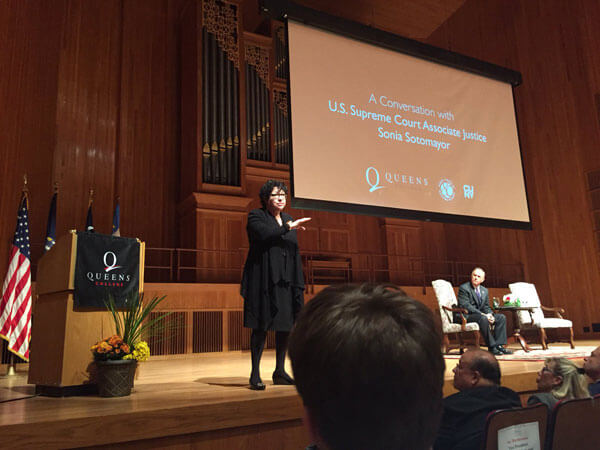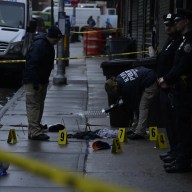By Gina Martinez
Supreme Court Associate Justice Sonya Sotomayor made a special appearance at Queens College Monday morning, participating in a Q&A with Queens College students and moderator President Felix Matos Rodriguez.
Sotomayor, who decided to walk around the Lefrak Concert Hall and talk face-to-face with students instead of remaining on stage, talked about what inspired her to get into law, the challenges of being a judge and handed out career advice to the students.
Rodriguez started off the Q&A by asking the justice if she was able to go back in time would she still have chosen law as a career or would she have gone in a different direction before she knew she would be on the Supreme Court? Sotomayor said she believes she was born to be a lawyer and what solidified that decision when she was only 9 years old was the television show “Perry Mason.”
“I really always wanted to be a lawyer,” she told Rodriguez. “I had an insight very early from watching that show on what lawyering meant and it’s an insight that’s guided me throughout my career and even today, which is what lawyers do is help people in their relationships in society. That’s what law does. Law regulates our behavior with one another, not moral judgment but legal judgement. It tells you what society finds acceptable or unacceptable, and what obligations, responsibilities and rights it’s going to give you within the society.”
She said lawyers help people, institutions and private and public entities manage their relationship to one another.
“I watched ‘Perry Mason’ manage his clients’ relationship with the state but also with helping them in their lives,” she said. “So that was attractive to me from the very beginning and has remained so my entire life.”
Sotomayor was born in the Bronx in 1954 to Puerto Rican parents. In 1976 she graduated from Princeton University with a B.A. degree and in 1979 she earned a J.D. from Yale Law School. Sotomayor began her career serving as an assistant district attorney in the Manhattan DA’s office from 1979–1984 and a federal prosecutor from 1992–1998 in the U.S. attorney’s office in Manhattan. She became a judge on the U.S. Court of Appeals, Second Circuit, from 1998 to 2009, when she was appointd to the Supreme Court after being nominated by President Barack Obama.
A freshman student asked the justice what advice she would give to first-year students.
“I think the most valuable degree in the world is a degree in the bachelor of arts,” she told her. “A liberal arts education is supposed to teach you what you don’t know, expose you to things that you know nothing about. That’s what learning should be, that’s what makes you a more interesting person, a more knowledgeable person and more than that a better person. For me, if you’re going to spend the money to go to college, take advantage of this place, don’t take courses in the things that attract you. How do yo know whether you’ll be good or bad at something unless you try it? How do you know what’s going to ignite the fire of your brain unless you take a chance and take courses just for the sake of learning?”
Sotomayor drew on her own experience. She said her first year she took an introductory art course so that when she went to museums she would finally understand the art and different styles. She said she also took Economics 101 and Religion 101 because when she opened up the newspaper she would mostly either read about war and economic policies. She said taking the courses helped her understand the verbiage and know the phrases, making her a better and more informed citizen. It also made it easier for her to do something as simple as reading the newspaper each day.
“My advice is take the classes that you think might scare you and find out what it’s about, “she said. “Have the courage to try different things. It takes courage to look at something and say “I don’t know if I’ll be any good at it but let me figure it out’”
Reach Gina Martinez by e-mail at gmart

























